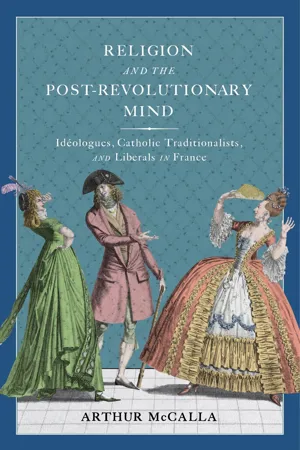
Religion and the Post-revolutionary Mind
Idéologues, Catholic Traditionalists, and Liberals in France
- English
- ePUB (mobile friendly)
- Available on iOS & Android
Religion and the Post-revolutionary Mind
Idéologues, Catholic Traditionalists, and Liberals in France
About This Book
The French Revolution swept away the Old Regime along with many of its ideas about epistemology, history, society, and politics. In the intellectual ferment that followed, debates about religion figured prominently as diverse thinkers grappled with the philosophical and civil status of religion in a post-revolutionary age.
Arthur McCalla demonstrates the central place of religion in the intellectual life of post-revolutionary France in Religion and the Post-revolutionary Mind. Certain questions – What is the nature of religion? Does society rest on religious foundations? What ought to be the place of religion in society? – drew sustained attention from across the political spectrum. Idéologues viewed religion as error and sought to eradicate it through the promotion of secular values. Catholic Traditionalists understood religion as a body of revealed truths of supernatural origin that ought to be authoritative in all aspects of life. Liberals sought to replace Christian orthodoxy with a new public faith consonant with liberal values. But these blocs were not monolithic, and McCalla reveals the complexities of each one, as well as the dialogues and rivalries among them. The categories established by the concepts of religion these thinkers constructed continue to shape debates over liberationist critiques, liberal pluralism, laïcité, and political theology.
The place of religion in civil society is again a matter of urgent debate. Religion and the Post-revolutionary Mind provides essential historical context for thinking about the status of religion in the contemporary world.
Frequently asked questions
Information
Table of contents
- Cover
- Copyright
- Contents
- Acknowledgments
- Dramatis Personae
- Introduction
- PART ONE A Liberationist Critique: The Idéologues
- 1 The Idéologues’ Science of Ideas
- 2 The Idéologues’ Critique of Religion
- 3 From Critique of Religion to Religious Policy
- PART TWO Sociological Traditionalism: Louis de Bonald
- 4 Bonald’s Science of Society
- 5 Bonald’s History of Religions
- 6 Bonald and Restoration Policy
- PART THREE Theological Traditionalism: Félicité de Lamennais and the Mennaisians
- 7 Lamennais’s Theological Traditionalism
- 8 The Mennaisian Science of Religions
- 9 Mennaisian Political Theology
- PART FOUR Statist Liberalism: Doctrinaires and Globistes
- 10 Rational Spiritualism
- 11 The Philosophical Status of Religion
- 12 The Civil Status of Religion
- PART FIVE Pluralist Liberalism: Benjamin Constant
- 13 Benjamin Constant and De la religion
- 14 Constant’s History of Religions
- 15 Liberal Pluralism’s Religion
- PART SIX Orientalist Traditionalism: Ferdinand d’Eckstein
- 16 Eckstein’s Traditionalism
- 17 An Orientalist History of Religions
- 18 Eckstein’s Political Theology
- Conclusion
- Bibliography
- Index